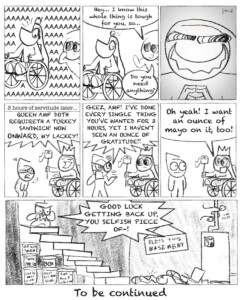Thomas Tucker is a relatively new face among math professors here at UR, having taught for only three years. He specializes in arithmetic geometry and is currently teaching graduate courses in algebra and number theory.
What is your motivation for doing research in arithmetic geometry?
Good question! I guess the short answer is that I find it interesting. And I like the feeling in math that you’re solving real questions of the sort that people might have asked thousands of years ago. For me, it’s very important that a question feel natural. That has pluses and minuses, though! It’s hard to come up with natural questions that are solvable but haven’t yet been solved.
Tell us about your interesting family history.
I come from a family of mathematicians (which used to bother me, to be honest) on my father’s side. My father is a mathematician at Colgate University and my grandfather taught at Princeton. In fact, my grandfather was John Nash’s thesis adviser. We were all disappointed that his character wasn’t really in “A Beautiful Mind.” We had a lot of fun talking about who might play him. I thought Albert Finney or Jason Robards would have been good choices.
On my mother’s side of the family, I come from a long line of big Red Sox fans.
What is your favorite course to teach here?
Probably the 170 series. The whole sequence is very well-designed in terms of the text books (especially Spivak’s Calculus) to the workshops to the fact that one or two professors teach the same group of students for the entire sequence. I also like that the course ends up being a bit of a compromise between proofs and computations.
What advice do you have for students who are interested in academia?
It’s important to be flexible. As a student, you may think that you’re interested in one field only to discover that you’re interested in something else completely different. You may think you like research more than teaching (or vice versa), only to find that the opposite is true.
It’s also very important that you make sure you’re not isolated. Academic research is very specialized these days and as a student you can feel that you have no one but your advisor to talk to about your research. As much as you might think that you can go it alone, you probably can’t, so you should make sure that you talk to other students about what it is you’re working on.
It’s good to be aware of what kinds of options there are for graduate school. There are a lot of great academic areas that students may not be aware of. In the mathematical sciences, statistics and biostatistics are both areas where there are lots of job opportunities and lots of interesting problems, but most undergraduates don’t know about these fields at all because there aren’t many undergraduate courses in these areas.
Moeller is a member of the class of 2009.

